Golden Jubilee Special Brochure
50 Years of Scouting In Rhodesia
Click to see a big photo

A message from Lord Rowallan
Former Chief Scout of the British Commonwealth and Empire
Click to see a big photo
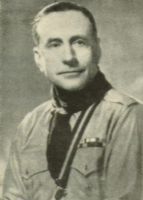

Message from Lord Rowallan Chief Scout 1959
50 Years, its a long time. A time to look back with gratitude to those who laid the foundations. Even more a time to look forward, to determine that we shall maintain the traditions and given even better Scouting to more boys,
Rowallan
Chief Scout
Editor's note:- Lord Rowallan, who has been Chief Scout since 1944, retired in September 1959. He wrote the above message when he attended the Central African Jamboree at Ruwa Park, Salisbury, in May 1959.
A Message from the President of the Southern Rhodesia Boy Scout Association, the Hon. Sir Robert Tregold, P.C., K.C.M.G. Chief Justice of the Federation of Rhodesia and Nyasaland.
The original edition of "Scouting for Boys", published by Baden-Powell before the Movement took formal shape, showed clearly that some at least of his inspiration sprang from the manly outdoor interests of the boys he had encountered in Southern Rhodesia. That he had not misjudged them ins proved by the fact that, so soon afterwards, a Group was formed in Bulawayo. It is a high distinction to have been regarded as the prototype of a good Scout, and it is a fine thing to have followed that ideal steadfastly for fifty years. May the Group long continue its proud record.
A Message from His Worship the Mayor of Bulawavo, Councillor S. H. Millar.
THE MAYOR’S PARLOUR,
P.O. Box 591.
BULAWAYO, S. RHODESIA.
In a country such as this, with its variegated pattern of commnunity aspirations, one of the most pressing needs is training for citizenship.
This training should include two different activities: firstly, experience of community life, with a view to promoting a wide social consciousness; and secondly, a study of society in general and the facts and principles of government in particular. In the former line a great amount of experiment and organisation has already taken place. Some experiments, such as the scouting movement, have met with remarkable success and have disclosed almost startling possibilities. Its success is to be found principally in its desire to be of service to others and in the direction of co-operation, and co-operation means fellowship and mutual service.
So being a firm believer in the Scout movement as an essential part of the fabric of society, I welcome this opportunity of congratulating it on its Golden Jubilee in Bulawayo. Although scouting was probably introduced in Bulawayo on an informal basis in 1907, the first group ever registered was the 1st Bulawayo (Pioneer) Group. But dates, although they serve as reminders, are not really important in themselves.
I think there must have been a very vital civic consciousness abroad in 1909 as quite a few Goldert Jubilees are, I understand, being celebrated this year. Celebrations are rightly a mark of achievement but they must not be inspired simply by the measurement of time but by achievement as well. That is the real acid test and when I look at the achievements of the Boy Scout Movement in self-reliance, discipline, and the moulding of good citizens, it has surely earned the praise and commendation of every one of us.
Ahead of us in this country lie tests of character and moral courage which can only be adequately faced with the qualities which the Movement have sought to stimulate in our young boys. This is a bigger contribution than is apparent to the casual eye, but the dividends will assuredly be there in the years to come. May you not only rejoice in your Celebrations, but go from success to success.
S.H. MILLAR,
Mayor.
|
"PIONEER TRAIL"
"PIONEER TRAIL" is a monthly, duplicated magazine distributed amongst parents of members of the 1st Bulawayo (Pioneer) Scout Group. It contains Scouting news, details of
activities of the Group, and articles on the ideas and principles of Scouting.
On the occasion of the Golden Jubilee of the Group, this special printed issue is being distributed, not only to parents, but to all members of the public. It contains articles of general Scouting interest, and we hope it will interest all readers.
However, it would not have been possible to publish this issue on our own. This issue has been sponsored by:
RHODESIAN PRINTERS, LIMITED
KINGSTONS. LIMITED
RHODESIA SUGAR REFINERY, LIMITED
RHODESIAN BREWERIES, LIMITED
CONSOLIDAIED TEXTILES (Rhod.) LTD.
MEIKLES (Byo.) (PRIVATE) LIMITED
CONTENTS
Pg
1 MESSAGE FROM LORD ROWALLAN
3 MESSAGE FROM THE HON. SIR ROBERT TREDGOLD, P.C., K.C.M.G.
5 MESSAGE FROM HIS WORSHIP THE MAYOR OF BULAWAYO
9 EDITORIAL
11 THE 1st BULAWAYO (PIONEER) BOY SCOUT GROUP
12-13 A PICTORIAL HISTORY OF RHODESIAN SCOUTING
15 THE GOOD CITIZEN
17 THE ORGANISATION OF SCOUTING IN MATABELELAND
21 “SKIPPER” KNAPMAN
23 GORDON PARK
25 BADGES OF THE MOVEMENT
26 THE LEFT HANDSHAKE
27 THE BOY SCOUTS AND YOU
29 LOOKING BACK AT THE JAMBOREE
30 GORDON PARK IN PICTURES
31 THE SCOUT SHOP
31 YOUR NEAREST GROUP
31 ACKNOWLEDGMENTS
32 GOLDEN JUBILEE CELEBRATIONS PROGRAMME
EDITORIAL
In July 1909, the Bulawayo Chronicle published a small paragraph which read: “A new boys’ movement has been started in England which is called the Boy Scouts. All its members go around dressed in big hats, short knickers and shirts, and carrying broomsticks. They can be seen wherever the country-side is heavily wooded chasing each other with their broom-sticks.”
Click to see a big photo

". . . in big hats, short knickers . . .“
Although, today, the Scout Movement is far better known than it was at the time when the above note appeared, there is still a large number of people who know nothing about Boy Scouts other than that they are supposed to “do a Good Turn every day”; and that the Wolf Cubs say “Dob, Dob, Dob, Dob.”
The 1st BULAWAYO (PIONEER) BOY SCOUT GROUP decided, accordingly, that they would publish this brochure, to tell you, and any other person interested, who, why and what the Scouts are. No charge is made for the brochure. The best payment you can give us is to read and think about the contents of this booklet.
On behalf of the 1st BULAWAYO (PIONEER) BOY SCOUT GROUP I should like to use this opportunity of thanking all those people, authorities and organisations that have helped the Group in any way over the past 50 years.
THE EDITOR.
- 1909 -  - 1959 - - 1959 -
THE 1st BULAWAYO (PIONEER)
BOY SCOUT GROUP
In 1909 three boys, having aquired a copy of "SCOUTING FOR BOYS," decided to become scouts. These three boys were the start of the
1st BULAWAYO (PIONEER) BOY SCOUT GROUP
In 1910 the Group began to take shape, under the leadership of the Rev. T.O.Beattie. He held meetings twice weekly in a small tin hut, nicknamed the "Bishop's Palace". The Group grew rapidly, and soon consisted of more than 35 boys.
1914 with the outbreak of war brought about a heavy drop in numbers. Several of the Scouts who joined the forces, lost their lives in the service of their country. Those who remained behind also played their part in the war by assisting organisations such as the Red Cross with war work.
1919-1929 were quiet years for the Group. Scouters of the Group changed several times, and it was during this period that a man who had been connected with the 1st Bulawayo longer than any other person, became Group Scoutmaster. His name - Skipper Jack Knapman. Skipper came at a time when the Group had no Scouters and everything looked very black. However, he soon put the Group on its feet again. He returned to the Group several times over the next 26 years. He is now an Ho. Life G.S.M. of the Group. The Group moved Headquarters twice during these ten years, the second time being into a tin hut sited where the present hall now stands.
1930 brought about the commencement of building the present hall, which was officially opened in 1933. The next few years were again quiet ones for the Group. Representatives of the Group attended the South African Jamboree in 1936 and were at the Bulawayo Show Grounds on the occasion of B-P's visit to Rhodesia.
1939 saw the Troop again diminished in numbers because of the war. Many went to the battle front, and those who remained again helped Red Cross and similar organisations in their self adopted war work.
With the war over in 1945 -1946 the Troop looked forward to a quiet period. However, troubles again hit the Group with one Scouter after another coming to us, and for varying reasons being obliged to leave. Between 1946 and Today there have been 15 Scouters.
During this period Lord Rowallan visited the colony in 1950. The Group took part in all the activities held for this occasion. Over the last few years the Group has participated in all events such as Bob-A-Job Week, the annual camping competition, First Aid Competitions and so on.
1959 marks the 50th year in the life of the Group. Members of the Group look back with pride of the last fifty years and intend to do everything in their power to make the start of the next fifty years as successful. The Group will be holding special Jubilee Celebrations in December and will continue to practice Scouting in the aims of Peace and Good Citizenship.

=== EARLY DAYS ===
Click to see a big photo
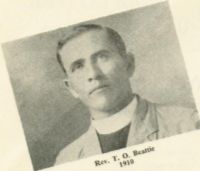
Rev. T.O.Beattie 1910
Click to see a big photo
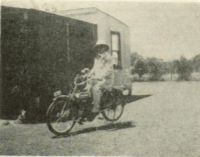
Rev. Beattie outside the "Bishops Palace"
(First meeting place of the Group)
|
Click to see a big photo
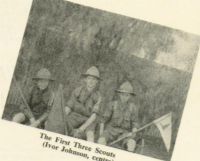
The First 3 Scouts in Bulawayo
(Ivor Johnson, center)
Click to see a big photo
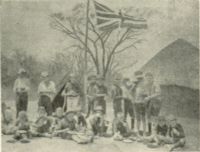
In Camp - 1911
Bulawayo
|
Click to see a big photo
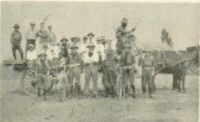
The Troop goes to camp - 1910
(Rev. Beattie, Center)
=== LATER DAYS ===
Click to see a big photo
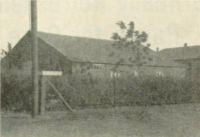
The Scout Hall 1920-1931
|
Click to see a big photo
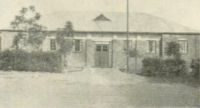
The Present Scout Hall built in 1931
|
Click to see a big photo
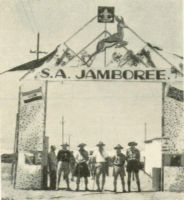
Rhodesians attended the S.A. Jamboree in 1936
Click to see a big photo
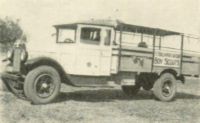
"Monty" the Groups Truck 1935-1950
|
Click to see a big photo
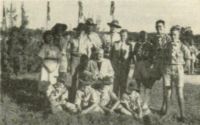
The Rev. Beattie (Seated) and Mr Ivor Johnson (Standing center)
with past and present members of the Group
at the Central African Jamboree.
|
THE GOOD CITIZEN
By G. E. STEVENS
Provincial Commissioner, Matabeleland.
IF you were a boy of thirteen or fourteen what would you like to do? Go out on some
adventure in the veld with two or three pals? Boat down a river or across a lake with nothing but your reflection in the water to keep you company? Climb a mountain and explore its caves or sleep under the stars beside a rippling stream?
These are the things most healthy active boys would like to do. And they have been done through the centuries by boys in all lands and of all races, for they go deep down into the fundamental ways of our lives. The genius of Lord Baden-Powell, the Founder of the Boy Scout Movement, lay in the recognition of these facts and in applying them to help create the worthwhile citizen of his country.
In this atomic age it is surprising and encouraging that boys can still take interest and enjoyment in the simple things of life. The sun and the moon; the songs of birds; the wind in the trees; the coming of Spring; the warmth of Summer; the colourings of Autumn; the freshness of Winter. All around them in the Open they can see and take pleasure in the great world of Nature and even a crowded city cannot wholely blot out the desire to get out of doors.
The appeal of Scouting lies in its outdoor activities. The training and meetings in Scout Halls and Dens are only preparation for life out of doors. Here a boy cooks his own meal, does pioneering with real logs and lashings, goes on long hikes down the valleys and over the hills and feels he stands on his own feet and must make his own way. At night the magic of the camp fire draws him with its songs and yarns and when he rolls himself in his blanket he feels it is good to be alive.
How does all this help to make a boy a good citizen? it makes him independent and self-reliant. It makes him observant and willing to learn. It teaches him to be dependable and resourceful. It sets great store on honesty. It shows him the values of being able to think and work by himself and of working for and with others. Above all it creates a wonder and a reverence for the creation of God in all its manifestations.
These qualities are wanted in every citizen and no boy should be denied the opportunity of developing them. They are the intangible things of the spirit and are with us all our lives and what we do with them and how we use them decides whether we are a good or bad citizen. What is a good citizen? Surely the man who looks first to the welfare and care of his family and then to the well being of his neighbours whoever they may be. None of us has the right to live to himself alone. We have inherited so much from those who have gone before us through the ages that we are obliged to give what we can of ourselves to the community of which we are a part. It is true that the more we give the more we increase the gift in our own personalities, in making others happy we bring happiness to ourselves.
It is not sufficient to want to help others, one must know how this can be done. The Scout Movement strives to create first the desire amongst its members to be of service. The daily “Good Turn” which so caught the imagination of the public in the early days is still an important part of the training and year after year public and charitable organisations pay tribute to the help received from Scouts. No matter how young the boy may be he can learn the first essential, the "Good Turn", as an individual or as one of his Patrol or Troop. He promises on his investiture "To do his best to help other people at all times" and it is to their credit that so many Scouts live up to the high standards people have come to expect of them.
First, one must be willing and alert to be of service. Then one must be trained to know what to do. From the time a boy joins the Scouts he is taken step by step along the path of this knowledge. All he learns is related to the life he lives out of doors and almost without knowing it he finds he is acquiring skill and handicrafts useful to himself and of value in helping others. First-aid, observation, swimming, cooking, map-making, pioneering, the highway code, hygiene and camping, all come in the Second and First Class Tests and they are followed by a large variety of Proficiency Badges designed to encourage a hobby and set a standard of achievement.
As the Scout becomes older he passes up to the senior section of the Movement— the Rover Scouts, where he endeavours to put into practice what he has learnt as a Scout. He is expected to adopt and be governed by the following principles:
(1) His Promise of Duty to God, through conscientious effort to develop his own spiritual life, and through the practice of his religion.
(2) His Promise of Duty to the Queen, through an earnest endeavour to secure a proper knowledge of the Government of his country, and to perform his duty as a citizen.
(3) His Promise of Duty to his Neighbours, through a logical development of the Scout Good Turn, after proper preparation and training, into some form of effective service to the community. In so doing he is asked to realise that his first service is to his home and to establish himself in life. He should make every endeavour to consolidate his position so that he is not a burden on others, or on the State.
(4) His Promise to Obey the Scout Law, by adopting it as an ideal to be expressed in his actions, and in goodwill, fellowship and clean living.
Here then we have arrived at the qualities of a good citizen — a man who plays a full part in his home and in his community. Who can give a lead and follow a lead. Who is respected and esteemed for his uprightness and singleness of purpose. Who takes joy in bringing happiness to others. Who honours his God and his fellow men.
The Boy Scouts Association offers this programme in its aim to develop good citizenship among boys by forming their character, training them in habits of observation, obedience and selfreliance and in promoting their physical, mental and spiritual development.
The Organisation of Scouting in
Matabeleland
by H. BLOCH
Public Relations Commissioner (Matabeleland)
The organisation of the Scout Movement is built up on unique lines. Its affairs are conducted by uniformed Scouters with the cooperation of groups of lay-men who, on the one
hand, relieve the Scouters of much administrative work and, on the other, act as representatives of the parents’ and public interest in the Movement.
The term "Scouter" denotes Commissioners — who are deemed to be the personal representatives of the Chief Scout—Scout Masters, Cub Masters, and their assistants. These officers are appointed to their ranks by way of a warrant which bears the personal signature of the Chief Scout of Southern Rhodesia, almost traditionally the Governor of the Colony. Commissioners can be recognised by the purple plume worn in their hat badge; they are entitled to fly a purple pennant from their vehicles. Group Scout Masters wear a green and white plume, Scout Masters and Cub Masters a green one, whilst those worn by Assistant Scout Masters and Assistant Cub Masters are red.
The organisation of a Scout province will be most easily understood by means of the diagram shown hereunder.
Provincial Commissioner
|
|------------------------------
|
|-------------|-------------|
Assist. Prov. Assist. Prov. Assist. Prov.
Commissioner Commissioner Commissioner
(Scouts) (Cubs) (Public Relations)
| | |
----------------------------
|
District Commissioner
|
|------------------------------
|
|
Assistant District Commissioner
|
|------------------|
Group Scout Master District Cub Master
|
|------------------------------
|
|------------------------|
Scout Master Cub Master
| |
Assistant Assistant
Scout Master Cub Master
|
Court of Honour
|
President
|
Chairman of the
Matabeleland Scout
Council
-----------|
|
|--------------|
Secretary Treasurer
Chairman of the
--- Local Association
|
|--------------|
Secretary Treasurer
--- Chairman of the
Group Committee
|
|--------------|
Secretary Treasurer
|
The Provincial Scout Council
This is composed of all Commissioners in the Province and its Local Associations which, moreover, are represented in the Council by their Secretaries and two delegates each, one of whom should be a Scouter, the other a lay-man. The Chairman, Secretary and Treasurer of the Council are lay persons elected to these offices. A president and Vice-Presidents may also be elected.
The Council is the governing body of the Province. In Matabeleland, one of its major responsibilities is the development and maintenance of the training and camping ground at Gordon Park in the Matopos.
Local Associations
Matabeleland is divided into three Local Associations designated "Bulawayo North", "Bulawayo South" and "Gwanda and District" Local Associations.
The Local Association has three classes of members:—
(a) Ex officio: The (lay) Chairman, Secretary and Treasurer. The Provincial Commissioner and his assistants. All Commissioners and Scouters in the District. In accordance with local practice, one lay member each nominated by every Group belonging to the Local Association.
(b) Such persons are elected or co-opted by the Local Association.
(c) Associates, i.e. persons interested in the Movement who acquire associate membership on application and payment of a fee of not less than 5/- for the calendar year. Are you a member? If not, we should like to enrol you.
The principal functions of the Local Association are the Registration of Groups. appointment of Scouters, supervision of Groups (in particular
finance) with the least possible interference with their independence and initiative, and the organistion of District events.
Group Committees
In contrast to the Scout Councils and Local Associations, Group Committees are fairly informal bodies of persons interested in assisting a particular Scout Group. Members are appointed or retired by the Group Scout Master who may hold elections for this purpose, if he so wishes, and who is an ex-officio member of the Committee. For the sake of smooth administration, a Group Committee usually elects or appoints a Chairman, Secretary and Treasurer.
The main function of a Group Committee is to assist in raising and to control the funds required for the maintenance of its hall, equipment and other purposes. The Group Committee is also responsible for the control of group property, but is concerned neither with the training and activities of the boys nor the supervision of moneys subscribed by them, which funds are administered by the Court of Honour. This is composed of the Patrol Leaders and, sometimes, the Seconds, of the Troop. All funds are subject to an annual audit.
The Scouters in the Group
The Group Scout Master is in control of the Group as a whole, which body, if complete. would consist of a Rover Crew, Scout Troop, and Wolf Cub Pack.
The Scout Troop is trained and supervised by the Scout Master and Assistant Scout Masters. Suitable persons who for some reason or other cannot be admitted to or accept warranted rank, may be given appointments as Instructors.
The Wolf Cub Pack is in the hands of the Cub Master and Assistant Cub Masters. There is always a desperate shortage of suitable volunteers to act in this capacity. Ladies are eligible and very suitable for this rank. Cub Masters are often assisted by selected Scouts who may be appointed is Cub Instructors.
(this page is sponsored by RUSSELL & CO.. Selborne Avenue, Bulawayo)
"SKIPPER"
By The Ven. J. N. STOPFORD
Deputy Camp Chief.
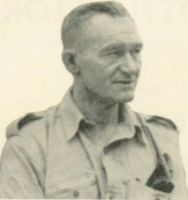 It happens to many Scouters at some time in their lives to be called "Skipper"; but to at
any rate the older members of the Movement in Bulawayo, and to a good many others in various parts of Rhodesia, there is only one real "Skipper", and that is Jack Knapman. Some years ago the Post Office endorsed this view and at the same time demonstrated its own efficiency by correctly delivering to J.K. a letter which was addressed only "Skipper, Bulawayo".
It happens to many Scouters at some time in their lives to be called "Skipper"; but to at
any rate the older members of the Movement in Bulawayo, and to a good many others in various parts of Rhodesia, there is only one real "Skipper", and that is Jack Knapman. Some years ago the Post Office endorsed this view and at the same time demonstrated its own efficiency by correctly delivering to J.K. a letter which was addressed only "Skipper, Bulawayo".
"Skipper" was born in London on 16th February. 1902. He joined the 1st Bognor Regis Troop in June 1913. As there were then no Wolf Cubs, he got into Scouting as early as he could:
if he had been born a little earlier, he would presumably have been at Brownsea Island for the beginning of it all. In 1915 he transferred to the District from which so much good Scouting has come, St. Marylebone. He was Second, Patrol Leader and A.S.M. of the 6th, and then he became S.M. of the 13th, a Troop which he founded. He was also Secretary of the Local Association. When Wood Badge Training started, he was quick to take advantage of it; he took his Scout Wood Badge in 1920 and the Cub Wood Badge a year later.
Rhodesia got him in August 1923, and he was immediately warranted as Scoutmaster attached to the first Colony Commissioner, Col. Birney. The following year he was second-in-command of the first Rhodesian contingent to go overseas to a Jamboree, the Empire Jamboree at Wembley. In 1924 he also took over the 1st Matabeleland Group (now the 1st Bulawayo), a job which he did not relinquish until 1946. Of the history of the Group during the time he was in the saddle you will read elsewhere. It is only necessary to say here that the successful development of the Group was largely due to "Skipper’s" knowledge and devotion, and that there are not many Groups which owe so much to one man.
His work as a Group Scouter was only a part of his Scouting. As the holder of a double Wood Badge at a time when Wood Badge was barely heard of in Rhodesia, he was put in charge of Scouter Training for the Colony in 1926, and is still in charge of it. He started the Bulawayo Scout Shop in 1934, and built part of the present building in 1939. Gordon Park was acquired in 1936, and he has been working there ever since, for a good deal of the time as Warden. It is possible to say, without being unfair to anybody else, that Gordon Park is the result of one man’s vision, and that what happens there in the next 20 years will be brought about by his planning over the last 20 years. By way of relaxation, he ran two Rhodesia Rallies at Central Estates in 1927 and 1928, the first Wood Badge course at Ruzawi in 1931, and led the Coronation Contingent to London in 1937.
There must be few men in the world who have given as much time and energy to Scouting as "Skipper", and few who have as sound a knowledge of its principles and techniques. Those who were Scouts under him in the ‘Troop will remember how difficult it was to catch him out on anything, and will also remember school holidays enlivened by classes on rope-spinning, leather-work, bow-making and other ramifications of the Scouting Trail. For 46 years most of his waking thoughts have been of Scouting. He had to make a living, but chose a way of doing it which would interfere as little as possible, and help as much as possible, in the primary purpose of his life. He has never married.
The Chief Scout recognised his service by the award of the Medal of Merit in 1929 and the Silver Wolf in 1936. It still remains for Rhodesia, and in particular for Bulawayo, to find some way of giving him the honour which is his due.
GORDON PARK
by J.KNAPMAN
Asst. Chief Commissioner (Training)
"In these Motopos hills in 1896 Lord Baden Powell, Founder of the Boy Scout Movement, was practising the principles of Scouting for the purposes of soldiering and War. In these same Matopos hills this training ground is dedicated in 1936 to the teaching of the principles of Scouting in the sense of good citizenship and peace."
Inscription in Gordon Park.
THE area now known as Gordon Park was found by a party of 1st Bulawayo Rovers in
1929, or more correctly, by one of those Rovers. Cyril Shaw, who later became Scoutmaster of the 14th Bulawayo Troop. I recall how we all scrambled across the waterfall and into the area which is now called Headquarters, and for years after that the Scouts and Rovers of the Group enjoyed many happy camps there. In those days, of course, there was no entrance road as there is today. and we had to carry all our kit from the main road and over the waterfall exactly as we had done when we first found the place, and all our water had to be carried in paraffin tins from the little stream.
Then in 1936 an event took place which was to change the character of our favourite camping spot. The late Lord Baden Powell, Founder of the Boy Scout Movement, was to visit South Africa for the South African Jamboree. Commenting on this visit in a leading article, the then Editor of the Bulawayo Chronicle referred to the absence of any public memorial in Southern Rhodesia to the man who had founded the greatest youth movement of all time. There is still no such memorial, but that leading article gave me an idea: A Scout camping ground and training centre in the very heart of the country where, during the Matabele Rebellion, he had practised so many of the crafts upon which he was later to base much of his scheme of Scout training.
I put this idea to Colonel R. Gordon, D.S.O., O.B.E., the Headquarters Commissioner for Matabeleland, and he received it enthusiastically. We got busy at once: he and I, accompanied by Mr. G. E. Stephens, M.B.E., now Provincial Commissioner for Matabeleland, inspected a number of prospective sites, but all had to be abandoned for various reasons. I then took them to the site in the Mtshelele Valley and it appealed to them both. It forms part of the Rhodes Matopo Estate, and Colonel Gordon undertook to make immediate representations to Mr. Frank Harris, who was at that time the Southern Rhodesia Minister of Lands, with a view to acquiring the site as a permanent Scout camping and training ground. Mr. Harris, who was most sympathetic explained that the land could not be alienated, but would be leased to the Association for a nominal rental of £1 per annum. The formalities were very quickly concluded and on the 16th February, 1936, the camp was formally declared open by Colonel Granville Walton, Imperial Headquarters Commissioner for Overseas Scouts, who was accompanying the Chief Scout to South Africa for his visit to the South African Jamboree. Some weeks later Lord Baden Powell himself visited the site and, in his book "African Adventures", records his impressions as follows:
"In the midst of this wild country, with its baboons and leopards and its vision of past battles fought among those kopjes, I was suddenly faced with a signboard pointing to 'Gordon Park, the Training Ground of the Boy Scouts’ Association'. Here, the wildest among the many jungle Gilwells that I have seen in different parts of the world, was a truly lovely backwood camping ground."
The camp is named after the late Colonel Gordon and following his death, the handsome wrought iron gates at the entrance were erected to his memory and were opened by His Excellency the Governor, Sir John Kennedy.
It became apparent that at some future date it would be necessary to have separate areas for Scout camping and Scouter training, so in 1947 we acquired an adjoining area, now known as the Bowl, and this is at present in the process of being developed as the new Scout camping ground. leaving the existing area as a Scouters’ Training Centre. The total acreage of the Park is now 285.
Gordon Park is a tribute to the efforts of many members of the Movement down the years, for there has never been much money available for its development and maintenance, and what has been achieved has only been possible by virtue of unbounded enthusiasm, optimism, ingenuity and scrap heap engineering, but in this place we are linked with a great pioneering and scouting tradition which we hope will play an ever increasingly important part in serving the boys of Rhodesia who are attracted to the ranks of the Scout Movement.
GORDON PARK IN PICTURES
Click to see a big photo
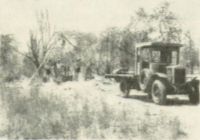
Looking for Water - 1936-1937
|
Click to see a big photo
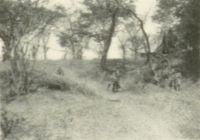
Scouts in Camp at the Park build an aerial runway.
|
Click to see a big photo
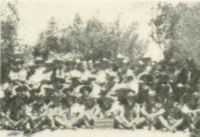
Official Opening of Gordon Park 16-2-1936
(This page sponsored by STEYNS FOUNDRY (Pvt.) Ltd., Gwelo)
OUR BADGES
by A. EDWARDS
District Commissioner (Bulawayo South)
THE proficiency badge system of the Boy Scout Movement is unique! From becoming a Wolf
Cub, at the age of eight years, to leaving the Rovers at the age of twenty-four years, a boy may earn badges of his own choice, and he has over one hundred to choose from. Every badge is designed to encourage mental growth, or physical growth, or both. Let us start at the beginning. When the boy first joins the Movement as a Cub, he is expected to pass his Tenderpad. After his Investiture as a Cub, he then works for his First Star. Thereafter, he trains for his Second Star, and after this, can pass any number of the thirteen special proficiency badges open to him. Let us examine the, shall we say, Artists Badge. (I am going to quote the actual wording of the Test).
(1) Must draw, in the presence of the Examiner, with pencil, brush, pen or crayon, an original illustration of any incident or character in a simple story.
(2) In addition, do one of the following:-
(a) Draw from life or memory, in pen, ink or pencil, any animal or human being he has seen;
(b) Draw from nature a landscape or still life group:
(c) Keep a sketch book for a period of three months;
(d) Illustrate a story by means of matchstick figures in a series of not less than four pictures.
(e) Make a simple greeting card of his own design using pencil, brush, pen or crayon.
(f) Make a model in clay, pyruma, or other plastic material.
NOTE: The natural bent of the boy is to be encouraged in every way; the spirit and intention of the work to count as much as adherence to academic rules.
This is a typical example as to how badges can be earned. The highest award of the Wolf Cub is that of the Leaping Wolf:— "A Leaping Wolf badge will be awarded to a Wolf Cub who has gained his Second Star and three special proficiency badges."

At the age of eleven the boy is expected to go up to the Scout
Troop where further training, beginning as a Tenderfoot, awaits him.
Next comes his Second Class badge (general proficiency) after which he may go in for his choice of the forty-three special proficiency badges. Let us now have a look at the Cooks badge, and here again I will quote from the actual requirements:
(1) Make a properly equipped camp kitchen with open fire, and prepare thereon three of the following dishes: stew, roast meat, vegetables, scrambled eggs, milk pudding, stewed fruit, or any dishes which the Examiner may consider equivalent, and make tea or cocoa.
(2) Know how to store provisions in an hygienic manner and bring proof that he has cooked satisfactorily for a Patrol or Troop in camp, for not less than one complete day.
(3) Make two of the following: twist, damper, flapjack.
The next general proficiency badge is the First Class badge, and now the boy is really beginning to be a Scout. He still has in view the highest badge of all — the Queen’s Scout badge — but before he can earn this he has to hold the Bushman’s Thong, and four of the Senior public service badges of which the Ambulance badge is obligatory. “A Queen’s Scout is one who, having thoroughly trained himself in Scoutcraft, places that training at the disposal of the community for Public service.”

When the young man becomes a Rover, at the age of 18 years, he has one general proficiency badge to earn, and then he may go in for any one of five special proficiency badges.
Special decorations are awarded for Gallantry and Meritorious Conduct. Further, there is the "Cornwell Scout" badge, which is an "exceptional award in respect of pre-eminently high character and devotion to duty, together with great courage, endurance, or gallantry."
We are rightly proud of our badges.
(This page sponsored by ETHERTONS, Stationers, Selborne Ave., Bulawayo)
THE LEFT HANDSHAKE
by S. O’Donnell
Deputy Chief Commissioner, Southern Rhodesia
BADEN-POWELL learned much from his experiences in many parts of the world, including the period
spent here in Southern Rhodesia in 1896. During his travels he met and talked with boys from many races and from many differing backgrounds. From all these experiences he built up a wonderful insight into the needs of boys, their aspirations, their actions, their very thinking.
Fundamentally he knew how important it is for a boy to feel he belonged to a group. His whole planning was built around this need. He introduced many things which would place all boys who became Scouts on the same footing, irrespective of their background, or their race or their religion.
B-P introduced the threefold promise, which every boy is bound to make on becoming a Scout.
"I promise, on my honour, that I will do my best,
To do my duty to God and the King (Queen),
To help other people at all times,
To obey the Scout Law."
After very careful consideration he drew up a list of nine Laws based on the code of Chivalry of the Knights of old. Trustworthiness, loyalty, duty, friendship for all, courtesy, obedience, friendship for animals, cheerfulness, thrift, and a year later added a tenth law:
cleanliness in thought, word and deed.
These laws call for a very high standard of conduct but are within the ability of any boy to achieve.
At the same time B-P introduced signs, "Secret" to the Scouts so that they could make themselves known to one another. A Scout salutes in a very special way, with three fingers erect when he brings his hand up to the brim of his hat. If he is not in uniform when he meets another Scout, he makes the Scout sign with three fingers erect but only bringing his hand up shoulder high with the palm of the hand forward. These three fingered signs are a constant reminder of the threefold promise. The best known Scout sign is the left handshake. This handshake is used when Scout meets Scout all over the world, whether in uniform or not.
The first Scout Camp was conducted by our Founder himself at Brownsea Island in August, 1907. with a small group of boys from various types of homes. This experience led to the publication in January, 1908, of Scouting for Boys, Part I. It was read first by boys all over the United Kingdom who quickly formed their own patrols and then looked around for Scoutmasters. The book was translated into German and Russian.
Patrols were formed in Europe. From the very beginning Scouting had enthusiastic support from the Royal Family. During 1909 King Edward VII gave very tangible proof of this by the institution of "Kings Scouts" those first class Scouts who qualify in certain subjects for service to the public. Her Majesty Queen Elizabeth II has been graciously pleased to change the title of this award to that of "Queens Scout".
Scouting grew at such a rate that B-P became worried about the men — Scoutmasters. Would those coming forward be worthy of the boys demanding their leadership? Right from the start he insisted on a system of testing men for moral integrity, ability and genuine interest in youth. Training became essential and led to the institution of Wood Badge Training for Scoutmasters. This badge is awarded only after a written test followed by practical tests conducted during a camp lasting eight days. It consists of replicas of beads taken from a necklace worn by Dinizulu, a Zulu Chief, after his capture by B-F, worn on a leather thong hung round the neck.
The badge system for Scouts was introduced to encourage boys to develop their interest in outdoor activities, physical development, hobbies and to prepare themselves for service to the public. This system alone is character building. B-P himself designed many of the badges together with the conditions for qualification. He even designed the plume worn by all Scouters on the side of their hat. His notes beneath the orginal sketch read "Scouts badge with circle round it and a green hackle (like that which Pearse wears on his hat)."
On the subject of uniform, who did invent the hat with the flat brim and the four dents in the crown? We would like to think it was B-P, right here in the Matopos as photographs tend to indicate, but he has disclaimed credit for doing so. In his writings B-P clearly mentions that such a hat was worn as early as the l890s by certain police in Canada although it was not until the turn of the century that it was officially recognised as part of the uniform of the Canadian Mounted Police.
B-P placed great emphasis on the international aspect of Scouting. The first truly international gathering was at Olympia in 1920. When B-P was asked why he had called it a Jamboree his instant reply was, "What else could you call it?" It was at this gathering that he was spontaneously acclaimed as Chief Scout of all the World, an appointment no other person is ever likely to hold.
Since 1920 Jamborees have been held, with certain interruptions, every four years. Southern Rhodesia has been represented at all World Jamborees up to 1957. The spacing of Jamborees has been no haphazard guesswork. It has been carefully determined that by holding World Jamborees every four years it is possible for every Scout to have the opportunity of attending at least one such gathering. World Rover Moots have also been held every four years, beginning at Kandersteg in 1931.
Two World Scouters Indabas have been held, the first at Gilwell Park in 1952 and the second at Sutton Coldfield in 1957.
In addition to gatherings held on a World basis many other similar functions are held on a regional basis, such as our Central African Jamboree in May this year.
A man, one man, planned well, so well in fact that even after 50 years of practice, amongst boys of all races, changes of principle have been quite unnecessary.
The left handshake has not changed. What does it mean to you? to your your son? Is there not some way in which you can be of help to boys of to-day, who are looking for leaders in much the same way as did the boys who knew B-P himself.
THE BOY SCOUTS AND YOU
By H. BLOCH
Public Relations Commissioner (Matabeleland)
THE aim of any boy joining the Boy Scouts is, or should be, to become a Queen’s Scout. "A Queen’s Scout", say the rules "is one who, having thoroughly trained himself in Scoutcraft, places that training at the disposal of the community for public service."
Service to others, one of the essentials of good citizenship, is held up to the boy from his earliest days in the Movement. On investiture as a Wolf Cub he promises "to do a good turn to somebody every day". When, some three years later, he is invested as a Scout, he makes the promise "to help other people at all times" and "to obey the Scout Law" which, amongst other things decrees that "a Scout’s duty is to be useful and to help others."
What, then, does the Movement do for you, Mr. Citizen? It aims to develop good citizenship among boys by forming their character, training them in habits of observation, obedience and selfreliance, inculcating loyalty and thoughtfulness for others, by teaching them services useful to the public and handicrafts useful to themselves, and by promoting their physical, mental and spiritual development. It does so free from political bias and on the broad religious basis that it expects every Scout to belong to some, but no matter which, religious denomination and, in the words of the Scout Promise, to do his duty to God.
All this is done in a manner which appeals to young people. Boys like to belong to an organisation with its own smart uniform, its own Law, the Scout Salute. They love the comradeship and the spirit of adventure which underlies the activities of a Scout group, the power of the Court of Honour which, under the guidance of the Scouters, largely rules the life of the troop, and they are keen, once sufficiently trained, to assume the responsibilities which the rank of a Patrol Leader carries.
In other words, if there were more Scouts, there would be fewer teddy boys, hooligans and juvenile delinquents and in the long run, more good citizens and not so many criminals.
To train more Scouts we need help, YOUR help. Usually. such phrase means "we want your money". We Scouts want more — we want YOU. There are many ways in which you can help. If you have an inclination to work with boys you can become a Scout Master or a Cub Master. If you have had past experience, all the better, if not, we shall train you. If you have some special aptitude and feel that you might like to work with boys, but that you cannot afford all the time a
Scout Master or Cub Master must sacrifice, you might become an instructor or examiner in a subject of your choice (First Aid, Photography, Languages, etc.). And should you prefer to assist in an administrative capacity, a Scout Group, Local Association or Provincial Council will be only too glad to make use of your services.
There is, of course, also the financial aspect. We take pride in trying to be self-supporting. We do not hold collections and, except occasionally for a major undertaking, such as the building of a Scout Hall, do not canvass for contributions.
Click to see a big photo
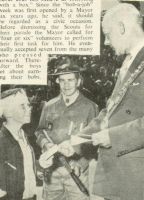 The Mayor of Bulawayo, Councillor S. H. Millar, presenting a prize-voucher to members of the 1st Bulawayo (Pioneer) Troop who won first prize for the most attractive float when "bob-a-job" week was officially opened on the steps of the City Hall. The Mayor recalled that the troop was the first to be formed in Rhodesia. They celebrate their 50th anniversary later this year. More than 270 Scouts were on parade before marching through the town with their attractive and amusing floats. Mr. Millar emphasised that the Scouts’ most important consideration should be "to give value for their money." It would, he said, inculcate the idea that what was worth having was worth working for. "The Scout does not believe in collecting with a box." Since the "bob-a-job" week was first opened by a Mayor six years ago, he said, it should be regarded as a civic occasion. Before dismissing the Scouts for their parade the Mayor called for "four or six" volunteers to perform their first task for him. He eventually accepted seven from the many who pressed
forward. Thereafter the boys set about earning their bobs.
The Mayor of Bulawayo, Councillor S. H. Millar, presenting a prize-voucher to members of the 1st Bulawayo (Pioneer) Troop who won first prize for the most attractive float when "bob-a-job" week was officially opened on the steps of the City Hall. The Mayor recalled that the troop was the first to be formed in Rhodesia. They celebrate their 50th anniversary later this year. More than 270 Scouts were on parade before marching through the town with their attractive and amusing floats. Mr. Millar emphasised that the Scouts’ most important consideration should be "to give value for their money." It would, he said, inculcate the idea that what was worth having was worth working for. "The Scout does not believe in collecting with a box." Since the "bob-a-job" week was first opened by a Mayor six years ago, he said, it should be regarded as a civic occasion. Before dismissing the Scouts for their parade the Mayor called for "four or six" volunteers to perform their first task for him. He eventually accepted seven from the many who pressed
forward. Thereafter the boys set about earning their bobs.
All our workers except for the Secretary to the Chief Commissioner of the Colony are volunteers —there are in Matabeleland alone approximately 10 Commissioners, 60 Scouters, and perhaps an equal number of lay members of the Provincial Council, Local Associations, and Group Committees. These men and women take pleasure in giving up much of their time, and some of their money, in providing these services for other peoples’ children — your children, if you care to send them to us.
Nevertheless, the operations of the Association require funds. The camping and training ground at Gordon Park, more than 200 acres of beautiful land in the Matopos, all developed with volunteer labour, must be maintained, and there is the upkeep, in Bulawayo alone, of nine Scout Halls and a heavy motor vehicle, in addition to running expenses and purchase of equipment for training.
These funds are raised, to a small extent, from subscriptions paid by the boys, which are kept at minimum level to enable any boy to join, and largely through the efforts of Group Committees. As far as the boys themselves are concerned, there is the inflexible rule that money should be earned and not solicited and that, for this reason. Scouts must not take part in collections, nor in any other method of touting the public. They do, however, undertake duties as ushers and programme sellers at concerts, sports events, and other functions and endeavour in a variety of other ways to EARN funds for their groups. These efforts culminate once a year in the now so well known "Bob-a-Job Week", the ceremonial opening of which the Mayor of Bulawayo, Councillor S. H. Millar, has described as a civic event.
Not always, however, is monetary reward the prime object of work undertaken by Scouts, and many a duty is carried out for its own sake as a good turn. The line of demarcation is clear. Scouts will gladly assist — and are eager to do so — any charitable or social cause, but they will not supply free or cheap labour to boost commercial gain. They have assisted civic authorities on public and royal occasions, and have served usefully in national emergencies. An outstanding example of efficient and reliable service — in this instance against payment at a rate offered by the Southern Rhodesian Government — was the manning of 83 census stations by between 600 and 700 Scouts during a road traffic census throughout Southern Rhodesia in May, 1958. Patrols of six Scouts under the control of a Patrol Leader were on duty at each station day and night without interruption for one week, a remarkable feat considering that by far most of the boys were below the age of 15 years.
Two years ago, when we celebrated the Golden Jubilee of World Scouting and the Centenary of the birth of Lord Baden-Powell, its founder, Olave, Lady Baden-Powell, the World Chief Guide, said:
"...If together, we can determine that in years to come no boy shall be denied the fun and happiness of Scouting through lack of the right men to lead, the Centenary will indeed have been worth while and in accordance with the hopes and dreams of our Founder."
We try to do our best. Will you help us?
LOOKING BACK AT THE CENTRAL AFRICAN JAMBOREE
By C. A. MARTIN
Jamboree Organising Commissioner
A multi-racial gathering of over 1,000 Scouts from Rhodesia and all its neighbouring
countries was first conceived in 1954. It was to have taken place in 1957 so as to coincide with the Jubilee Year of World Scouting, but because of the enormous task in financing and organising the biggest ever Southern Rhodesian contingent to attend an overseas Jamboree, the local effort was postponed for two years.
Then the detailed planning began, and arrangements were made in consultation with the Branches of the Scout Movement in neighbouring territories.
An important early decision was the venue — what better place than at Gordon Park in the Matopos where our beloved Founder did so much to foster the spirit of Scouting and backwoodsmanship. Unfortunately, five years ago a plentiful supply of water in the Matopos could not be assured and so, Ruwa Park, near Salisbury. was accepted as an excellent alternative.
After the original steering committee had held meetings with Government representatives, under the Chairmanship of His Excellency the Governor and Chief Scout of Southern Rhodesia, the details soon started to take shape. The most formidable task was staffing, as it soon became evident that more than 100 people would be required to give the 1,000 visitors an experience of a life-time.
It was decided to hold the Jamboree in May, for a period of 10 days. What better news, early on during the planning, that Lord Rowallan himself, the Chief Scout of the British Commonwealth and Empire, had accepted our invitation and would be flying out from England to open the Jamboree officially. At the same time research revealed that 1959 was the 50th year of Scouting in Rhodesia, and the addresses were found of Canon T. 0. Beattie, the first Scoutmaster, and Mr. I. Johnstone, one of the first three Scouts. Both were invited to attend the Jamboree as guests of the Camp Chief, and what a pleasure it was when they accepted!
The duties of the Jamboree staff were enormous. Amongst others, they included catering, obtaining supplies of heavy camping equipment, movements, local tours, excursions, public relations, press, publicity, films, recordings, hospital and first aid, post office, scout shop, tuck shop, banking facilities, laundry and hygiene. These were just a few of the tasks before the organising committee.
During the Jamboree there were sports displays and entertainments organised by the arena manager — these in turn required film shows, public address systems, brass bands, camp fires, pageants and tribal dances.
There was also an exhibition tent. This included outstanding displays of scouting activities such as the Scouts assault on Kilimanjaro; and a display of Scouting history in this country supported by exhibitions by the Central African Archives and other public bodies.
All of this cost money and as usual behind the scenes were those who gave their untiring efforts to the financial organisation. A considerable portion of the finances were donated, including a great deal of the money required to build a swimming bath, which is now a permanent amenity of Ruwa Park. Help was also given by many people in kind. Fathers and Mothers came to Ruwa over weekends to help. Equipment was loaned by many organisations.
But the work of all was rewarded, when on the 3rd May, to a resounding noise, contingents, some more than 100 strong, others only one, started to arrive by foot, by road, by train and by air. The countries represented were Basutoland, Bechuanaland, Belgian Congo, Kenya. Pakistan, South Africa, Swaziland, Tanganyika, United Kingdom, U.S.A. and of course, the three countries within the Federation.
When on May 4th Lord Rowallan officially opened the Jamboree, there were no less than 1,126 uniformed members living in camp, and there were many lay helpers. The quartermaster supplied food for no less than 35,000 square meals during the Jamboree.
Many thousands of visitors attended each day, to tour the camps and witness the arena displays. Visitors included the Governor-General of the Federation, the Governors of the three territories, Prime Ministers, Mayors and many other prominent citizens.
Considering that some boys had walked many miles to the nearest transport to commence their journey, and some had never seen a train, let alone an aeroplane, it was not surprising that the aerial display given by the Royal Rhodesian Air Force, worthy of any occasion, was much appreciated.
When the time came to leave, the closing ceremony was performed by the Chief Scout of Southern Rhodesia. The spectators witnessed a spontaneous display of brotherhood after the flames which illuminated the Scout Badge against the night sky died down. After linking hands and singing Auld Lang Syne, groups of boys of all races, colours and creeds linked arms and walked around the arena singing the Jamboree song, specially written for the occasion, until, when tired and weary they returned to their tents for a last night’s rest before the mass exodus.
Within a day all was quiet — those on post Jamboree tours were on their way, the myriads of tents were down and soon all remnants of the canvas town were gone, the resounding noise of pots and pans, knives, forks and billy cans floated away. A spectacle and experience had ended, but it would remain in the memories of all - nay, more than memories, for with the official Government newsreels and documentary colour films, and the many private photographs and movies, the vivid records will always remain a living proof of universal brotherhood.
YOUR NEAREST GROUP
1st Bulawayo (Pioneer) Lobengula Street/8th Avenue.
2nd Bulawayo Institute Avenue, Raylton.
3rd Bulawayo Connaught Avenue/Grey Street.
* 4th Bulawayo Technical School (Russell House).
5th Bulawayo Girl Guide Hall, Bellevue.
* 6th Bulawayo Whitestone School.
* 7th Bulawayo (Catholic) Lobengula Street/9th Avenue.
8th Bulawayo Cecil Avenue, Hillside.
* 9th Bulawayo Milton School, Kumalo.
11th Bulawayo Marimba Road, Riverside.
12th Bulawayo Scout Hall, Milton Junior School Grounds, Borrow Street/9th Avenue.
14th Bulawayo Athlone Avenue/Colenbrander Ave., North End.
* 15th Bulawayo Milton Junior School.
18th Bulawayo Kumalo School, Kumalo.
20th Bulawayo Dundee Drive, Famona.
* 21st Bulawayo (Handicapped) King George VI Rehabilitation Centre, Kumalo.
* These Groups are open only to members of the School, or Faith. respectively.
|
THE SCOUT SHOP
THE function of the Scout Shop is to serve the Movement with its requirements; supplying the best possible quality at the lowest possible prices. It ensures
high quality to the best of its ability by careful selection of goods, and is able to maintain low prices by ensuring that the profit “mark-up” is as low as possible.
The Scout Shop is not a profit making concern, having an extremely low mark-up. designed to cover expenses and create a small reserve.
In Bulawayo, the Scout Shop opens once a week, on Wednesdays from 4.30 p.m. — 6 p.m., and is situated on 8th Avenue Extension. All members of the Movement are welcome to come and see the many books and other items of stock that are carried.
ACKNOWLEDGMENTS
GOING to press a considerable time before the issue of this magazine, we are obliged to express our acknowledgments more as a generality than to individuals in particular.
The 1st Bulawayo (Pioneer) Boy Scout Group wishes to express its sincere thanks to the contributors to this magazine, the many people who have helped us in any way, and to you, the Public, for the support you have given us over the years.
We wish to express our special thanks to Mrs. P. Gallagher, who designed the cover for us.
THE EDITOR.
GOLDEN JUBILEE CELEBRATIONS
1959
Friday, December 4th
Interdenominational Thanksgiving Service. Technical School, Rhodes Street, 8 p.m.
Monday, December 7th
Golden Jubilee Dinner for all members, old Scouts, and friends of the Movement. Crystal Court, Grand Hotel, 7.30 p.m. Any persons interested should contact the Assistant Provincial Commissioner (Public Relations), P.O. Box 1348 Bulawayo; or telephone 5544.
Saturday, December 12th
All Star Variety Show at the Milton Junior School Beit Hall, at 8.15 p.m. All welcome. Admission: Adults 3/6, Children 1/6.
Thursday, December 17th
to
Saturday, December 19th
Models Exhibition at the Milton Junior School Beit Hall.
Thursday and Friday 2 p.m. to 10 p.m., Saturday 10 a.m. to 10 p.m.
Admission: Adults 1/-, Children 6d.
THE ABOVE PROGRAMME IS SUBJECT TO ALTERATION WITHOUT NOTICE.
ENROLMENT FORM
I would like to become a Scout/Cub* in the ................ Group.
My name is ...........................
Address ..............................
Telephone ............... Age ...... Birthday ......................
Religion ........................... School ........................
Parent’s Consent:
I hereby give full consent to my son, ........................................
to join the .................................... Group.
Date ................. Signature ..............................
* Delete whichever is not applicable.
Adverts:-
World Famous Beverages
Canada Dry
Mixers Soft Drinks
Ginger Ale Sparkiling Orange
Soda Water Cream Soda
Lemonade Strawberry
Tonic Water
Ginger Beer
Be Sociable -- Drink Pepsi-Cola
|
See the New Raleigh Moped
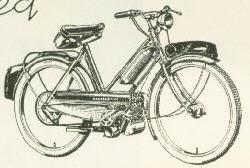 The Finest motorised bicycle
The Finest motorised bicycle
on the market today - gives
200m.p.g., and is available
in two models.
Without clutch £58-10-0
with clutch £63-2-6
Alick Stuart (Pvt.) Ltd.
96a Abercorn St, Bulawayo, Tel 5065/6
|
GRAND HOTEL
Main Street Bulawayo
Tel 60744 P.O.Box 598
FOR ALL
YOUR CATERING
REQUIREMENTS
*
PALACE HOTEL
Abercorn Street Bulawayo
Tel 5241 P.O.Box 520
CAROUSEL
COCTAIL BAR
|
A Matter of
History
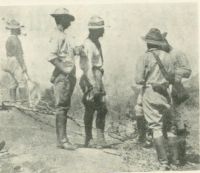 It is probable that the flat brimmed hat with four dents worn by Boy Scouts the world over was adapted in Southern Rhodesia. It is recorded that Colonel Baden-Powell bought a Stetson hat in Bulawayo at Beesley & Co., an associate Meikie business. His companion in taking the hat from the box made the indentations in the crown now so familiar. "B.P." wore the hat in that style for the rest of his stay in Matabeleland.
It is probable that the flat brimmed hat with four dents worn by Boy Scouts the world over was adapted in Southern Rhodesia. It is recorded that Colonel Baden-Powell bought a Stetson hat in Bulawayo at Beesley & Co., an associate Meikie business. His companion in taking the hat from the box made the indentations in the crown now so familiar. "B.P." wore the hat in that style for the rest of his stay in Matabeleland.
The picture on the left shows “B.P.” in the centre of a group of Hussar officers in the Matopos wearing the famous Scout hat.
THE MEIKLE ORGANISATION OF RHODESIA
send greetings and good wishes to the Boy Scouts of Matabeleland on the occasion of their Diamond Jubilee
|
For an enjoyable holiday in Livingstone stay at...
FAIRMOUNT
HOTEL
The Tourist Hotel for the Victoria Falls.
Relax in the happy atmosphere of our Ballroom and Beer Garden
Bed and Breakfast from 18/-
P.O.Box 96 - Tel 2366
|
On top of the world with
Voyager
Hand-tailored
Trousers
100% Virgin Wool
Obtainable at all leading outfitters
|
Use...
Zenith
Envelopes
and
Jet Mail
Writing
Pads
*
Manufactured in Bulawayo
|
Ellis Allen
(Pvt.) Ltd
Drawing and Surveying
Materials and Equipment
Prismatic compasses
Wrist strap compasses
Boy Scout diaries
Rhocem House - P.O.Box 204
Selborne Ave - Phone 61600
Bulawayo
|
Launders and Dry Cleaners
To the Boy Scouts since their inauguration
Look smart on parade...
If your clothes are not becoming to you
They should be coming to us
For... Laundry : Dry Cleaning : Dyeing
Foam cleaning of carpets and
Upholstered furnishings
consult...
MATABELE STEAM LAUNDRY
(Pvt.) Ltd.
Telephone (works) 828188/9
|
For a Wide Selection of...
Gifts, High Class Cosmetics
and purfumery
visit...
Patterson's Pharmacy (Pvt.) Ltd.
The household and veterinary chemists
Tel 5959 and 64040 - 10th Ave Bulawayo
Prompt delivery service to all areas
|
Pyott's biscuits
make an easily carried meal
when on a hike or in camp
- then quench your thirst with
Roses Lime Juice
|
Reg. Hart & Sons
(Pvt.) Ltd.
Selborne Ave
Ph 4020 - 61810 - 62983
Auctioneers and Estate
Agents
Congratulations and best wishes
to the Boy Scouts Association
on its
50th Anniversary
|
Get to know the Matopos
...and make your headquarters
the homely
Matopos Hotel
Excellent Crusine and Service
And easy run from town, and a pleasant
afternoon drive
Fully licenced
P.O.Box 430
Phone 88044-12
|
"Boy! Oh Boy! Lok at that camping equipment!"
Yes, we have everything in the way of camping equipment for those who go for the great outdoors. So come in and scout around our showrooms - we'll show you camping stuff that will facinate you, but really facinate you!
S.A.Canvas Co (Pty.) Ltd.
114 Fort St : Bulawayo
Tel 3936 or 60636
also at:
Salisbury: S.A.Canvas (Pty) Ltd., Manica Rd, P.O.Box 927. Tel 28711
Copperbelt: Johns & Gould (Pty.) Ltd, P.O.Box 646, Ndola. Tel 2974
Gwelo: Mr H.Swaine, P.O.Box 401. Tel 3361
|
MATABELELAND FARMERS
Co-OPERATIVE LTD.
We have been appointed Official Selling Agent
for the S.R. State Lottery - call in and choose
your lucky Ticket
*
Come to us for all your fresh fruit and
vegetable requirements
*
Pay us a visit... it will pay you
*
MATABELELAND FARMERS
Co-OPERATIVE LTD.
94, Fife Street
BULAWAYO
P.O.Box 558 - tel 63113
*
Branches at North End, Bradfield and Gwelo
|
SHOP AND SAVE
At
GORDONS
Branches at:
Fife St - 60051/60002
Hillcrest - 62595
North End - 5820
Bradfield - 62784
|
Be Really Refreshed - Pause for a Coke
On top of the world - what a happy day for hiking - with the sun so gentle, the air so clear. The green fields stretch out to meet the sky - its good to be alive in such a beautiful world! And when you reach the top of the hill, its time to rest for a while and enjoy the welcome lift of Coca-Cola. Always delicious and refreshing.
Drink Coca-Cola. Sign of Good Taste in ove 100 countries. Bottled under authority of The Coca-Cola Company by:
Bulawayo Bottlers (Pvt.) Ltd.
|
A Scout is Clean...
Brand-new way to get shaves that look and feel like a million!
Now a razor with:
1. Right edge angle
2. Right edge exposure
3. Right weight for your face and beard
Gillette Razors are available in three types: light, medium and heavy.
Make a GILLETTE shave a must!
|
GLASS SERVICES
(Pvt.) Ltd.
Telephone 2344 P.O. Box 1592
132 FIFE STREET, Cnr. 14th Avenue
BULAWAYO
For all House-proud wives...
Protect and enhance your furniture with glass tops cut and polished by our experts.
For your motor car...
We can supply and fit all windscreens,
door glasses, channelling, etc.
|
Everyone
ENJOYS CAMPING - THE SMELL OF THE CAMP FIRE! THE RUSTLE OF THE GRASS! - DON’T SPOIL THIS
BY NOT BEING EQUIPPED WITH A FEW COMFORTS...
- SLEEPING BAGS FROM 65/-
- IGLOO INFLATABLE (POLELESS) TENTS £35
- GROUND SHEETS WITH INFLATABLE PILLOW 23/9
- HIKING TENTS - FROM 63/-
- RUCSACS
- TORCHES
- GRIDS
- LI LOS
- STOVES
- COOLERS
- CANTEEN SETS
- SHEATH KNIVES
- STRETCHERS
Sports Department - FIRST FLOOR
Sanders Ltd, Bulawayo
|
CABS
CENTRAL AFRICA BUILDING SOCIETY
BE A GOOD SCOUT
AND
SAVE FOR THE DAY
OPEN A SAVINGS ACCOUNT NOW
INVESTMENTS FROM 4% to 6%
BRANCH OFFICES:
Colray House - Hillside Shopping Centre
Ninth Avenue - Bradlows Stores
|
DEFY...
THE LEADING STOVE
IN THE FEDERATION
Box 1043 BULAWAYO
RADIO Ltd.
Tel. 60046 ALSO AT SHABANI
|
One day-you’ll want to own an AUSTIN
CARMART Ltd
THE AUSTIN PEOPLE
BULAWAYO - SALISBURY - GWELO
|
CONTINENTAL DANCE ACADEMY
Principals
HARRY and SONJA CARRUTHERS
Member, I.S.T.D. (H.Comm.) London
Member and Examiner, S.A.D.T.A. (H. Comm.).
Three times S.A. Mixed Professional Champion.
Thorough Training for
* BEGINNERS
* STUDENTS
* AMATEURS
* PROFESSIONALS
we spedalise in soft movement,
elegance and impeccable style
KAYMAR HOUSE — 105 GREY STREET
Phones: Studio 5756 :: Res.: 63144
|
WHERE SHOPPING
IS A PLEASURE
ALL YOUR NEEDS
UNDER ONE ROOF
HADDON & SLY
LTD
FIFE STREET - BULAWAYO
Telephone 60336
|
SATCOY
—when you are building
THE
SOUTH AFRICAN TIMBER COY.
(Pvt.) Ltd.
ABERCORN STREET AND FIFE STREET
BULAWAYO
|
NORTH END
BOTTLE STORE
(Licensee: V. KANNGIESER)
KENILWORTH
P.O. SAUERSTOWN
TELEPHONE 828261
YOU RING - WE BRING
DELIVERIES TO ALL SUBURBS
|
BE PREPARED
FOR
YOUR CHRISTMAS HOLIDAYS
HAVE YOUR CAR SERVICED
AND CHECKED IN THE MOST
UP - TO - DATE AND BEST
EQUIPPED WORKSHOP AND
SERVICE LINE IN THE MIDLANDS
MIDLANDS GARAGE (Pvt.) Ltd.
Main Street
P.O. Box 129 - Phones 2518, 2573, 3587
GWELO
|
GREENWAY LAUNCH
AND TAXI SERVICE
P.O. Box 209 or 221 - Telephones 2477 and 2563
LIVINGSTONE
FOR
* TAXIS AT ALL HOURS.
* SELF DRIVE CARS AT ALL HOURS.
* LAUNCH CRUISES ON THE ZAMBESI.
* HUNTING AND FISHING SAFARIS.
* PHOTOGRAPHIC SAFARIS.
* AIR FLIPS.
* BOATS TO HIRE.
* LOCAL TRIPS TO ALL PLACES OF INTEREST IN LIVINGSTONE AND THE FALLS ARRANGED.
WHEN IN LIVINGSTONE STAY AT THE FALLS MOTEL
|
You make it!
This Windmill Pump is only one of hundreds of
working models you can make
with Meccano. From the
smallest set you start building
a whole series of first-class
engineering jobs — exciting
realistic models each one of
them. You learn as you build,
and you build better and better
as you learn. You grow up with
Meccano because you add to your
stock of gears, wheels, girders
and strips as time goes on.
You adapt. You invent.
You’re a real engineer!
The TOY that grows with the BOY
MECCANO
MADE IN ENGLAND BY MECCANO LTD.. BINNS ROAD, LIVERPOOL 13
|
A Scout is SMART at all times
Be Smarter... wear
CHARTER CLOTHES
Extension belt, elastic sidestrap and rubberised waistband.
American syled with Self Belt and two hip pockets. Superbly tailored.
Large range of colours.
|
SUGAR FOR ENERGY
Rhodesia Sugar Refinery Ltd
|
For Men of Distinction
Jax and Ascot Trousers
Stocked by leading outfitters in the Federation
A RHODESIAN PRODUCT you will be proud to wear
Manufactured by
ASCOT CLOTHING (PVT.)LTD
P.O. Box 8193, BELMONT, BULAWAYO
|
|



